For the sustainable development of the Mekong River Basin
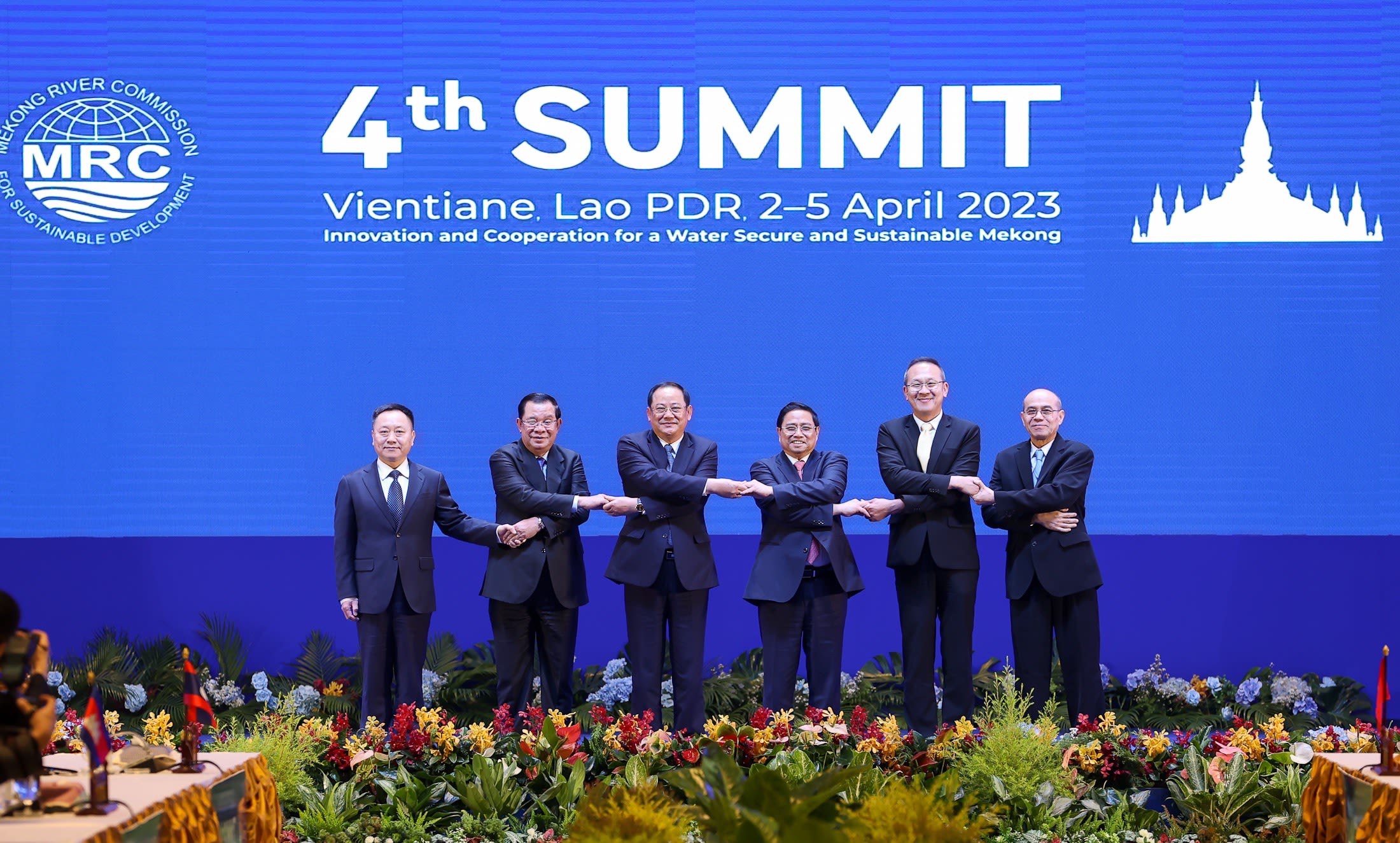
Prime Minister Pham Minh Chinh has successfully concluded the visit to attend the fourth Summit of the Mekong River Commission (MRC) in the Lao capital of Vientiane under the theme “Innovation and Cooperation for a Water Secure and Sustainable Mekong”. The PM’s working trip continues to affirm Vietnam’s commitment and contribution to enhancing cooperation between MRC member countries, as well as with partners, for the sustainable development of the Mekong River Basin as well as the region and world in general.
GOAL OF STABILITY AND PROSPERITY
At the fourth Summit of the MRC, the member countries analysed and assessed the challenges and opportunities concerning water resources, including sustainable development and environmental management issues in the region; identifying the basin’s development and management orientations; continuing to affirm political commitment at the highest level in enhancing the effective implementation of the 1995 Mekong Agreement and the MRC’s functions; and affirming the purposes and principles of cooperation for the basin’s sustainable development.
SOME KEY POINTS OF THE VIENTIANE DECLARATION
■ Recalling the 1995 Mekong Agreement and the establishment of the MRC by the representatives of the Lower Mekong River Basin Governments, based on basin-wide perspectives, and building on a long history of Mekong cooperation since 1957 with the establishment of the Committee for the Coordination of Investigations of the Lower Mekong Basin.
■ Noting the priority actions and commitments from prior MRC Summits and their ongoing relevance to MRC Member Countries.
■ Recognising the importance of the Mekong River Basin’s contributions to the water-related aspects of the UN 2030 Agenda for Sustainable Development, the Paris Agreement on climate change, the Sendai Framework for Disaster Risk Reduction 2015-2030, the ASEAN agenda on regional integration, connectivity and closing the development gap within the ASEAN community, and the need for a strong recovery from COVID-19 in the midst of changing and complex international and regional challenges, and in that context, reaffirming the value of multilateral cooperation.
■ Recognising the growing sense of urgency around the critical challenges, risks and opportunities facing the Lower Mekong River Basin countries now and in the future resulting from the interaction of development and climate change, and that optimal water management to achieve a water secure Mekong River Basin is crucial to environmental integrity and the underpinning of economic and social well‐being of basin communities, but that new ideas and innovative ways of working together will also need to be found to adequately address the growing risks and trade-offs involved in basin development and management.
■ Acknowledging the enhanced opportunities for water, food and energy security that are available to all Mekong countries, through regional cooperation and joint efforts that are possible if all countries work together.
■ Emphasising the importance of a strong and financially sustainable treaty-based River Basin Organisation, within the evolving institutional environment in the Mekong River Basin, for managing water and related resources.
■ Welcoming the greater engagement of all basin countries in the sustainable management and development of the basin, in a spirit of friendship and cooperation.
■ Acknowledging the participation and cooperation of MRC Dialogue Partners, and Development Partners and others, for their continued commitment to cooperating with MRC Member Countries.
■ Reaffirm our highest political commitment to the effective implementation of the 1995 Mekong Agreement, and the role of the MRC as the primary regional water cooperation and diplomacy platform, as well as a knowledge hub in enhancing the implementation of basin-wide strategies, procedures, guidelines, and data and information sharing that, drives peaceful and mutually beneficial cooperation, to achieve our shared vision for an economically prosperous, socially just, environmentally sound and climate resilient Mekong River Basin.
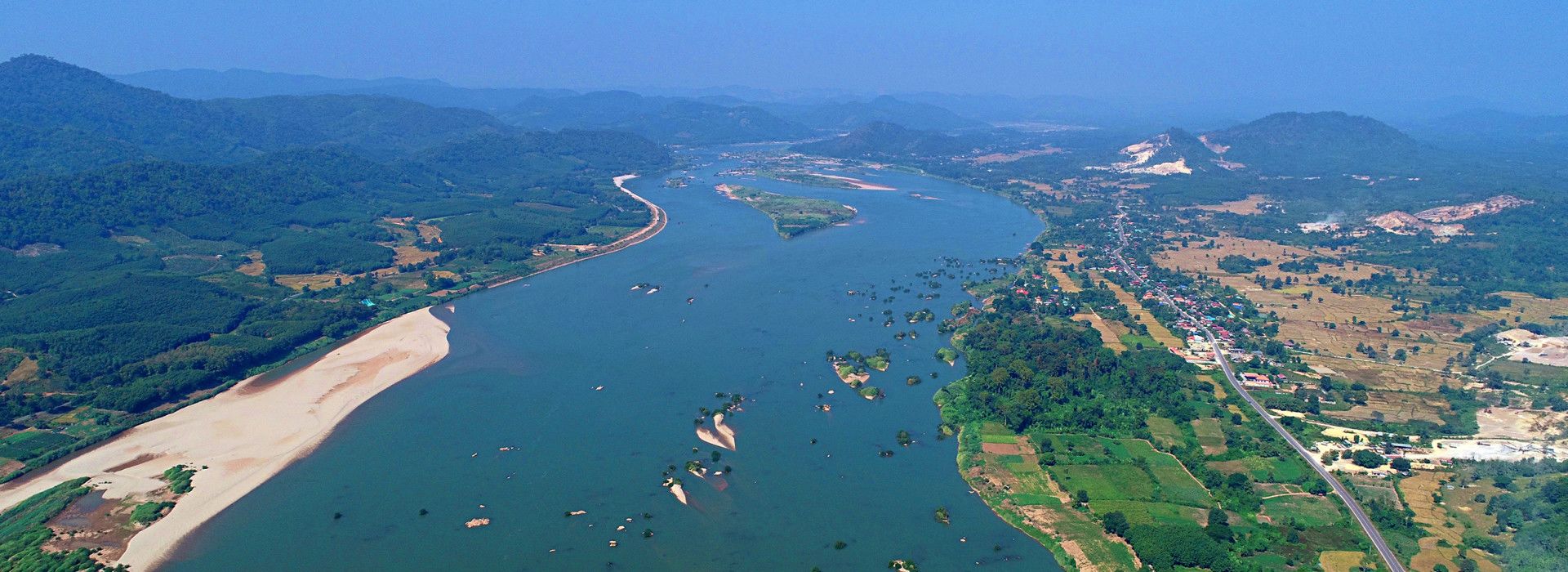
Prime Minister Pham Minh Chinh spoke highly of the indispensable role of the MRC, as well as its efforts to effectively perform the functions and tasks of an international river basin organisation, helping affirm the value of the 1995 Mekong Agreement.
Prime Minister Pham Minh Chinh said that the Mekong River basin is facing great challenges due to the synergistic impacts of climate change, the pressure of economic development requirements and the rapid increase in water use, which makes the river’s water resources degraded in both quantity and quality, directly affecting efforts to ensure water and food security for all countries in the basin.
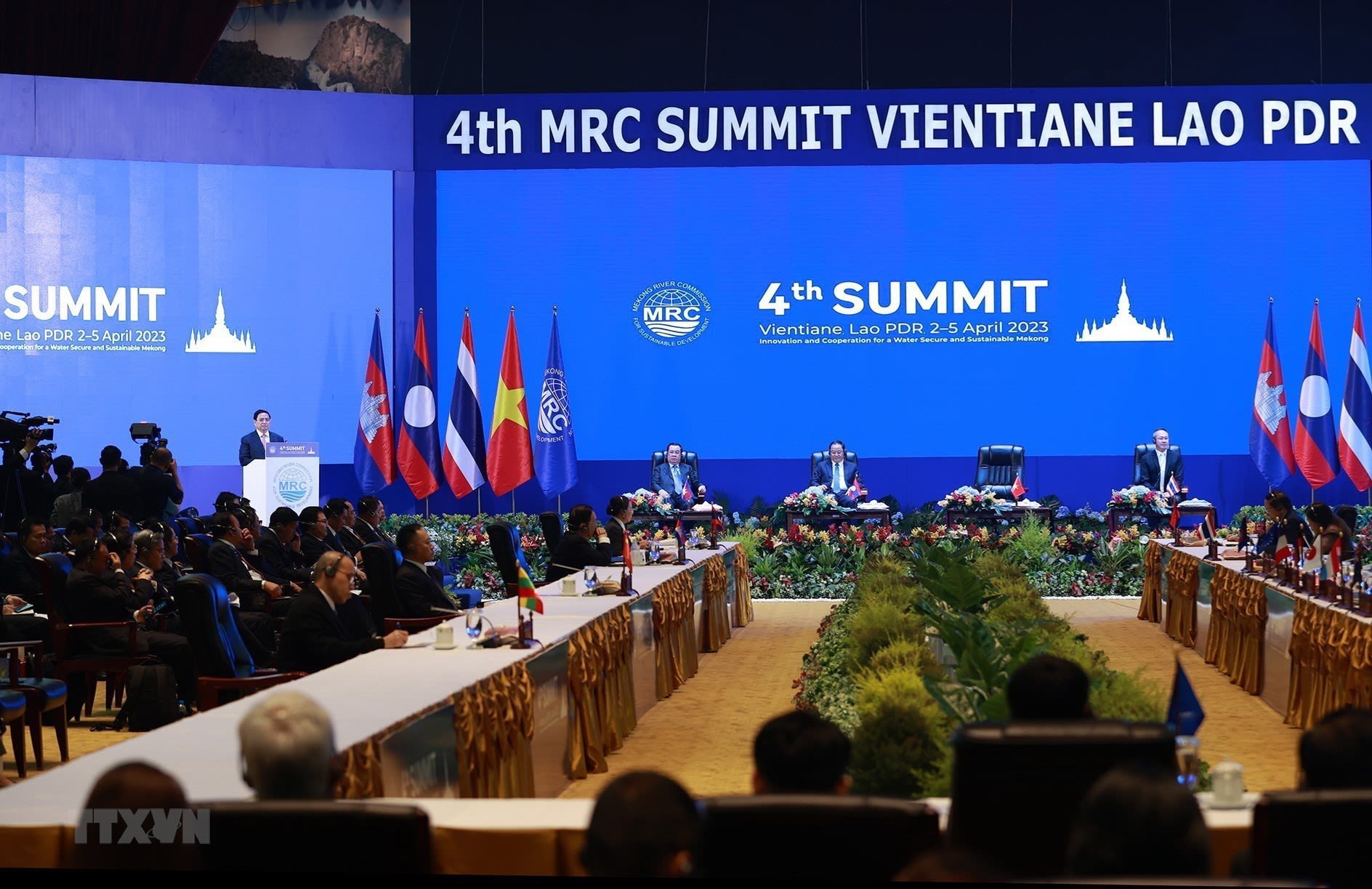
An overview of the conference
An overview of the conference
Prime Minister Pham Minh Chinh emphasised that as a country located downstream of the Mekong River, Việt Nam is feeling these heavy impacts most clearly. The flow from the upper Mekong River to the downstream and the Mekong Delta has been severely reduced. The delta often faces severe droughts, and the saline intrusion tends to appear 1-1.5 months earlier, with a greater scale and intensity than before.
In 2020, the amount of sediment in the Mekong Delta decreased to only one-third of that 15 years ago. This directly affects the livelihoods of more than 20 million residents in the Mekong Delta region, as well as efforts to ensure water and food security for all countries in the basin.
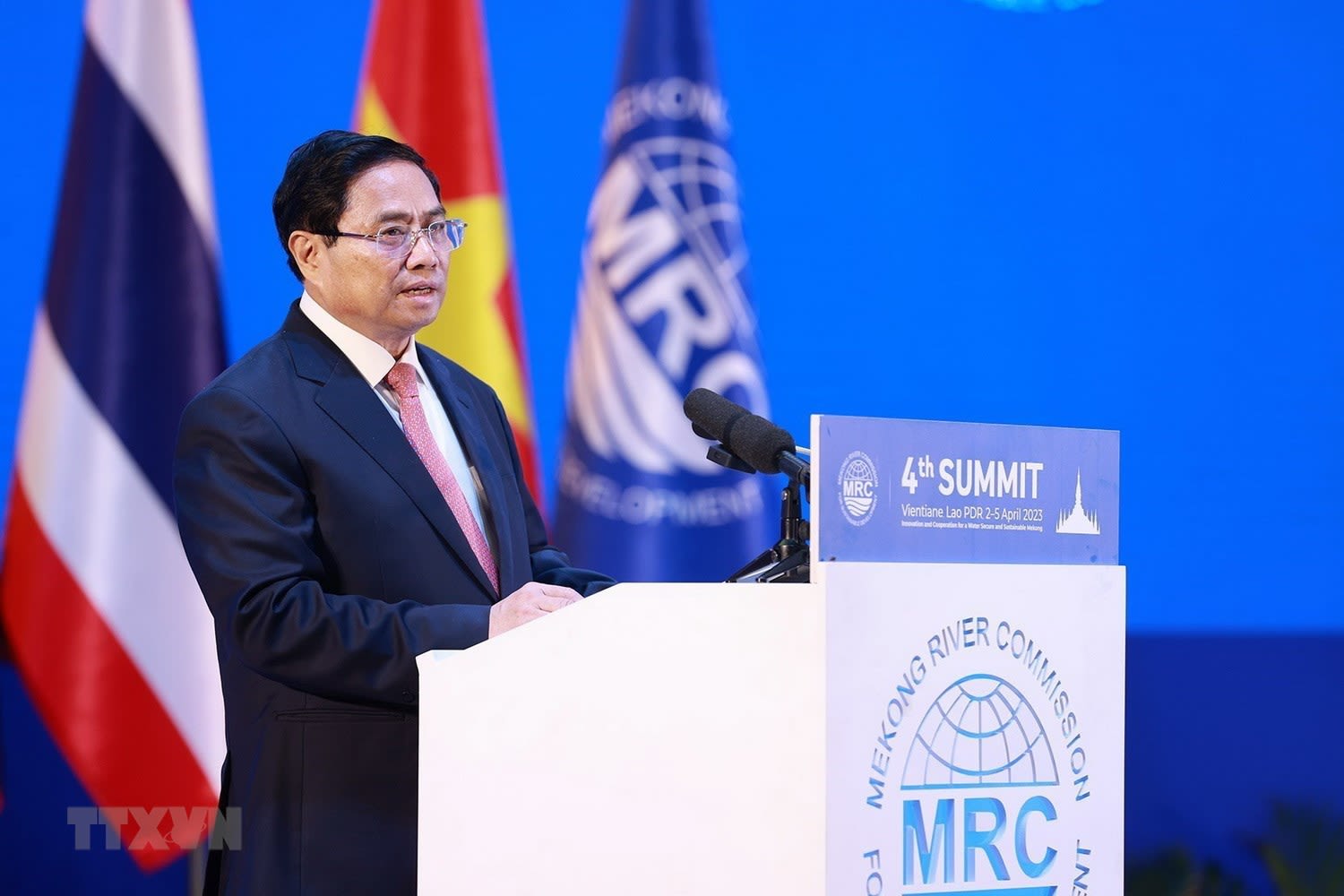
Prime Minister Pham Minh Chinh speaks at the fourth Mekong River Commission Summit in Vientiane, Laos.
Prime Minister Pham Minh Chinh speaks at the fourth Mekong River Commission Summit in Vientiane, Laos.
Given the situation, PM Chinh suggested the MRC continue to affirm its strong commitment to, serious compliance with and effective implementation of the 1995 Mekong Agreement, as well as the set of regulations on water use, particularly the fundamental principles of sovereign equality and territorial integrity, fair and rational use of water resources, reasonable maintenance of flows on the main stream, and prevention and limitation of negative impacts, especially for downstream countries.
All relevant policies and actions of the MRC and its member countries need to put people at the centre, ensure sustainable livelihoods for them, and protect legitimate rights and interests of those living in the basin.
The Prime Minister emphasised that all relevant policies and actions of the MRC and its member countries need to put people at the centre, ensure sustainable livelihoods for them, and protect the legitimate rights and interests of those living in the basin. It is necessary to strengthen cooperation in the prevention and combat of transnational crimes; strive to make the MRC an intelligence hub providing information, data and knowledge about the basin, and consulting services to help other sub-regional cooperation mechanisms perform their functions.
Countries need to promote the development of a green and circular economy, support regional plans for research and development of renewables such as wind and solar energy, and connect and upgrade electricity grids of the region, thereby contributing to sustainable development, ensuring energy security and responding to climate change.
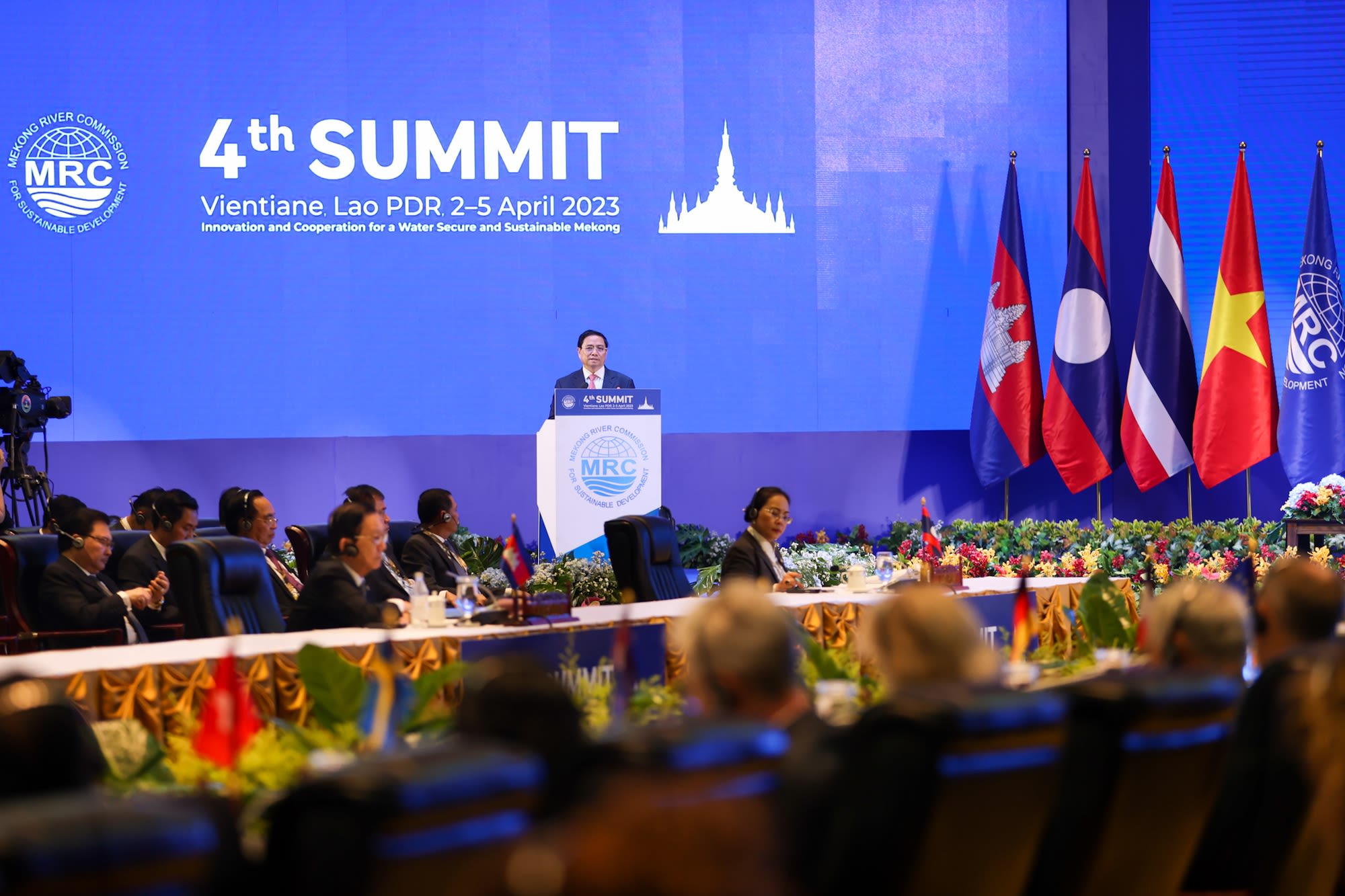
The Vietnamese Government leader suggested further renovating in the management and administration, enhancing the enforcement capacity of the MRC, and promoting freedom of navigation. He also called for the conduction of a substantive and comprehensive assessment of the riparianisation process in the Mekong River, thereby continuing to perfect and streamline the organisation and operational methods of the MRC.
Vietnam always upholds the role of the MRC and commits to working closely with member countries to successfully implement the commission's strategies, plans and action plans, for the purpose of building the prosperous, equitable and healthy Mekong River Basin that is adaptive to climate change, for peace, stability, development and prosperity of the ASEAN Community.
Prime Minister Pham Minh Chinh called on partners to strengthen cooperation and support the MRC, in financial resources, knowledge, experience and modern technology. In addition, MRC’s activities need to be more closely linked with activities to implement the ASEAN Community Vision, the United Nations’ Sustainable Development Goals, international commitments on climate change, and other commitments at the recent United Nations Conference on Water.
Prime Minister Pham Minh Chinh affirmed that Vietnam always upholds the role of the MRC and is committed to working closely with member countries, to successfully implement the MRC’s strategies and action plans to build the Mekong River Basin, which is economically prosperous, socially just, and environmentally sound and resilient to climate change, for peace, stability, development and common prosperity of the ASEAN Community. On this occasion, on behalf of the Government of Vietnam, the Prime Minister expressed thanks for the cooperation and support of dialogue partners, development partners and international partners, for supporting Vietnam and other countries in the region.
“Prime Minister Pham Minh Chinh’s attendance at the Summit showed his interest and determination, to promote Vietnam’s proactive role in responding to challenges and strengthening solidarity with countries in the Commission, to sustainably manage and use the Mekong River’s water resources, ensuring the interests of the countries in the basin, including Vietnam.
At the Summit, the Prime Minister delivered very important, profound and comprehensive messages.
Firstly, the Prime Minister strongly affirmed Vietnam’s commitment to the 1995 Mekong Agreement, calling on countries to fully comply with this agreement, as well as the set of rules that have been developed, related to the use of water resources of the Mekong River.
Secondly, the Prime Minister emphasised a comprehensive, and basin-wide approach, using people as the centre and the subject in exploiting and using water resources, in the Mekong River, while protecting people’s legitimate rights and interests and enhancing people’s ability to adapt to the current fluctuations of the river, as well as extreme and complicated weather phenomena, floods, droughts, and transnational crimes in the basin.
Thirdly, the Prime Minister proposed specific cooperation activities, including enhancing data sharing, joint research, responding to climate change, promoting sustainable waterway transport, coordinating in handling transnational crime, building a green economy, circular economy, boosting grid connection, and energy development in the region.
Fourthly, the Prime Minister called on partner countries, especially upstream countries and development partners, to cooperate, share data, and strengthen support in knowledge, experience, finance and resources, for the Commission to perform its functions and tasks, ensuring sustainable development of the river and the Mekong River basin.”
Deputy Foreign Minister Do Hung Viet
CONSOLIDATING VIETNAM-LAOS-CAMBODIA COOPERATION
On the occasion of attending the 4th MRC Summit in Vientiane, Prime Minister Pham Minh Chinh met with Lao Prime Minister Sonexay Siphandone and Cambodian Prime Minister Hun Sen. In a friendly and cordial atmosphere, the three Prime Ministers spoke about the socio-economic development of each country and exchanged views on cooperation areas between the three countries, as well as international and regional issues of common interest.
The leaders attached great importance to maintaining regular high-level contacts and exchanges on all channels, including the meeting between the three Prime Ministers to constantly strengthen solidarity, friendship and cooperation. They also highly appreciated the organisation of many meaningful activities within the framework of the Vietnam - Laos, Laos-Vietnam Solidarity and Friendship Year 2022 and the Vietnam-Cambodia Friendship Year 2022, contributing to raising people’s awareness, especially the young generation each on the tradition of solidarity and friendship between the three countries.
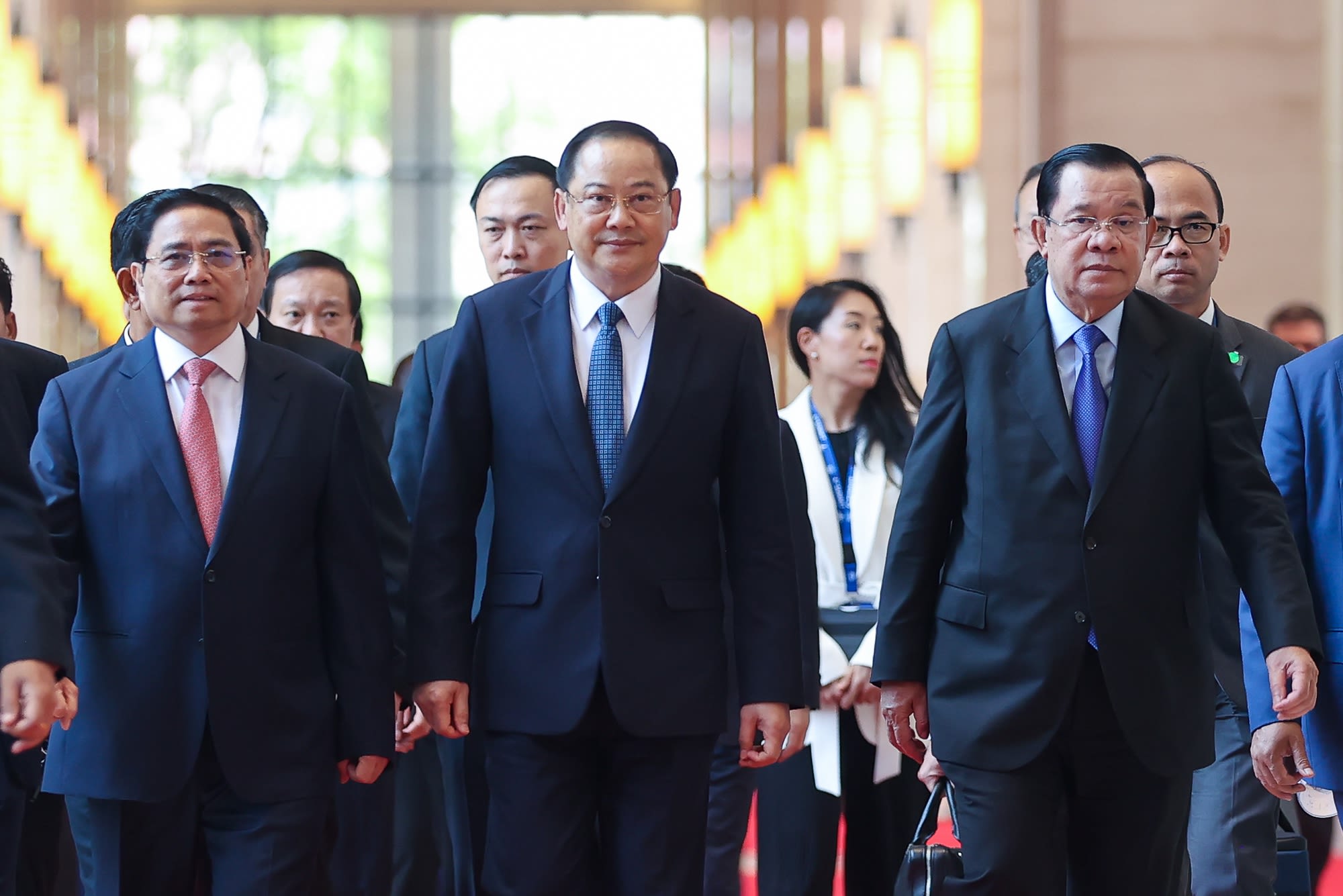
Prime Minister Pham Minh Chinh has a working breakfast with Lao Prime Minister Sonexay Siphandone and Cambodian Prime Minister Hun Sen.
Prime Minister Pham Minh Chinh has a working breakfast with Lao Prime Minister Sonexay Siphandone and Cambodian Prime Minister Hun Sen.
The Prime Ministers agreed to step up cooperation to connect the three economies and support each other in building an independent and self-reliant economy; deepen substantive and effective international integration; create more favourable conditions for investment and business cooperation activities of enterprises of the three countries; encourage border trade and bring the land border gate system between the three countries into play; and share experiences on law-making, management and effective use of official development aid (ODA).
The three Prime Ministers said that in the context of complicated and unpredictable global economic developments, rapid development of digital technology and social networks, and profound impacts, the three countries need to strengthen economic cooperation and exchange experience in the field of information technology.
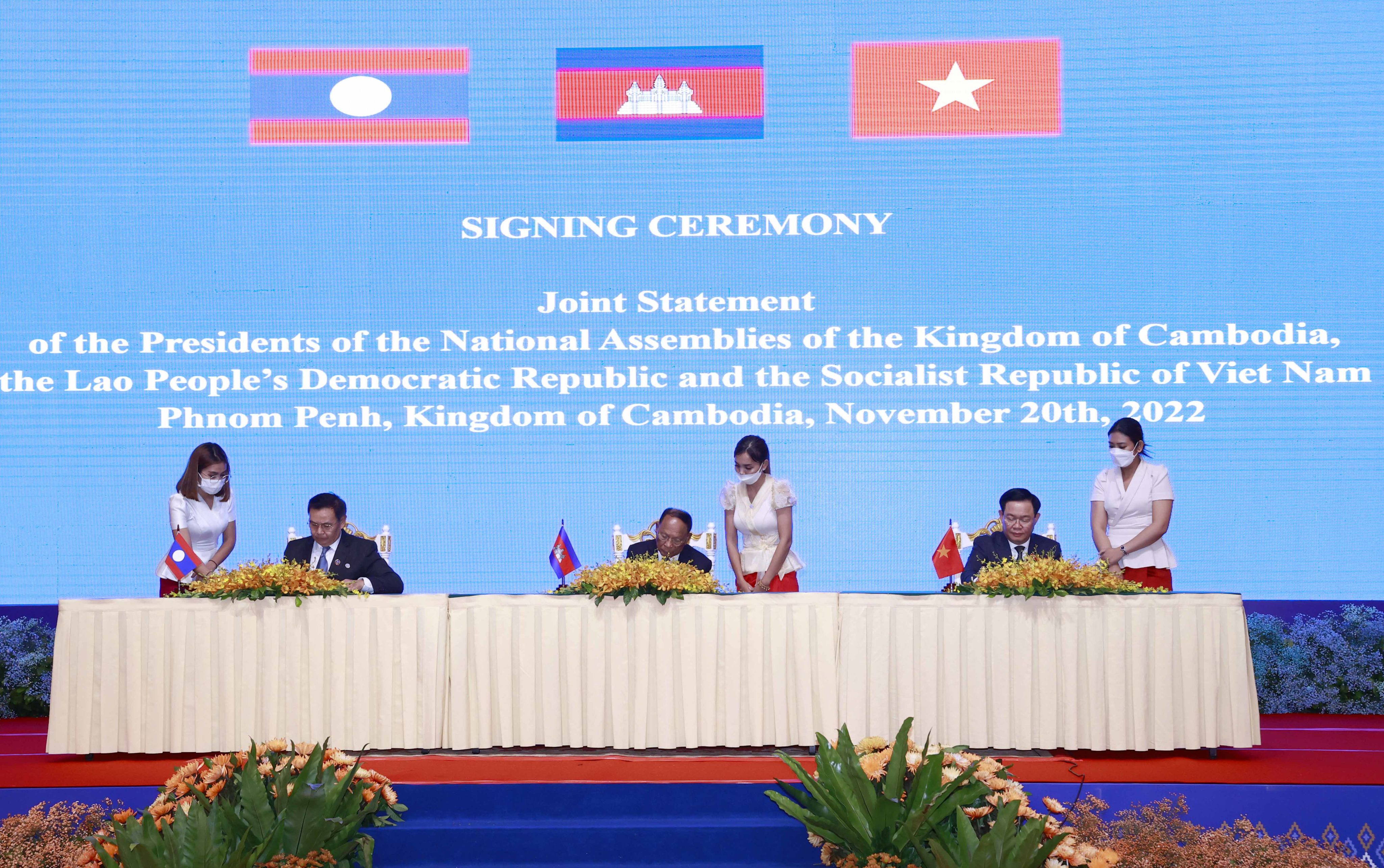
The leaders of the National Assemblies of Cambodia, Laos and Vietnam sign the Joint Statement of the Summit of the National Assembly of Cambodia, Laos and Vietnam (CLV), November 2022.
The leaders of the National Assemblies of Cambodia, Laos and Vietnam sign the Joint Statement of the Summit of the National Assembly of Cambodia, Laos and Vietnam (CLV), November 2022.
The three government leaders pledged to continue their close coordination in regional and international issues, and further contribute to maintaining and consolidating ASEAN’s solidarity, unity and centrality, and agreed to combine sub-regional cooperation with the building of the ASEAN Community for equal, sustainable development, and to narrow development gaps and strengthen ASEAN connectivity.
They spoke highly of the consensus to organise the first Cambodia-Laos-Vietnam National Assembly Summit in Vientiane in 2023, and the 12th Cambodia-Laos-Vietnam summit on development triangle in Cambodia.
Prime Minister Pham Minh Chinh and Lao Prime Minister Sonexay Siphandone once again congratulated Cambodia on successfully taking on the role of ASEAN and AIPA Chair in 2022, emphasising their belief that Cambodia will successfully organise the 32nd SEA Games and the upcoming VII National Assembly elections.
Prime Minister Pham Minh Chinh and Prime Minister Hun Sen continued to affirm their support for Laos to successfully assume the role of ASEAN Chair in 2024.
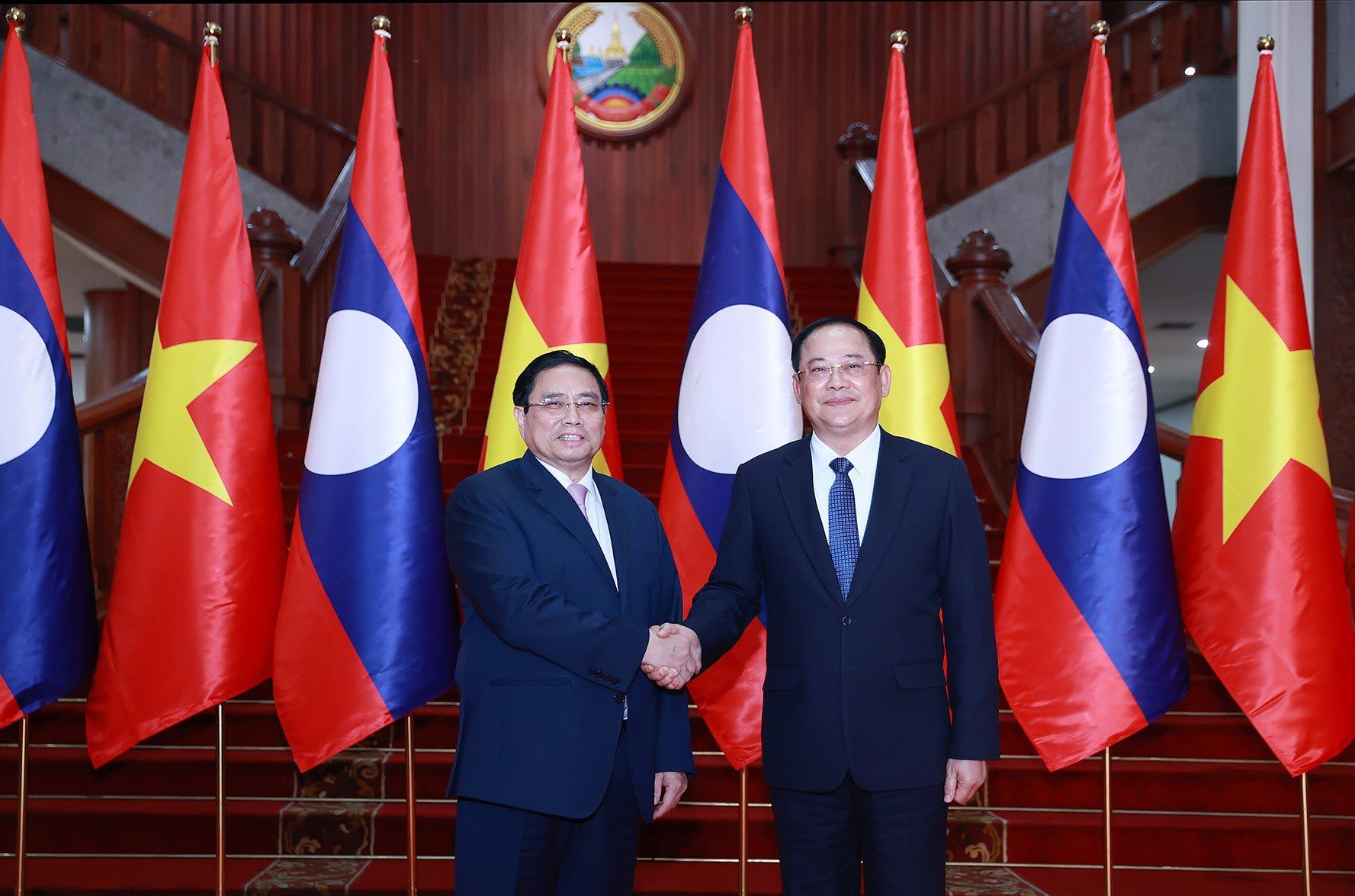
Prime Minister Pham Minh Chinh and Lao Prime Minister Sonexay Siphandone.
Prime Minister Pham Minh Chinh and Lao Prime Minister Sonexay Siphandone.
At his working session with Lao PM Sonexay Siphandone, PM Pham Minh Chinh congratulated Laos on the successful organisation of the 4th MRC Summit, thereby contributing to enhancing the role and position of Laos in the region. Lao PM Sonexay Siphandone gave his thanks to PM Pham Minh Chinh, for his attendance and contributions to the summit’s success.
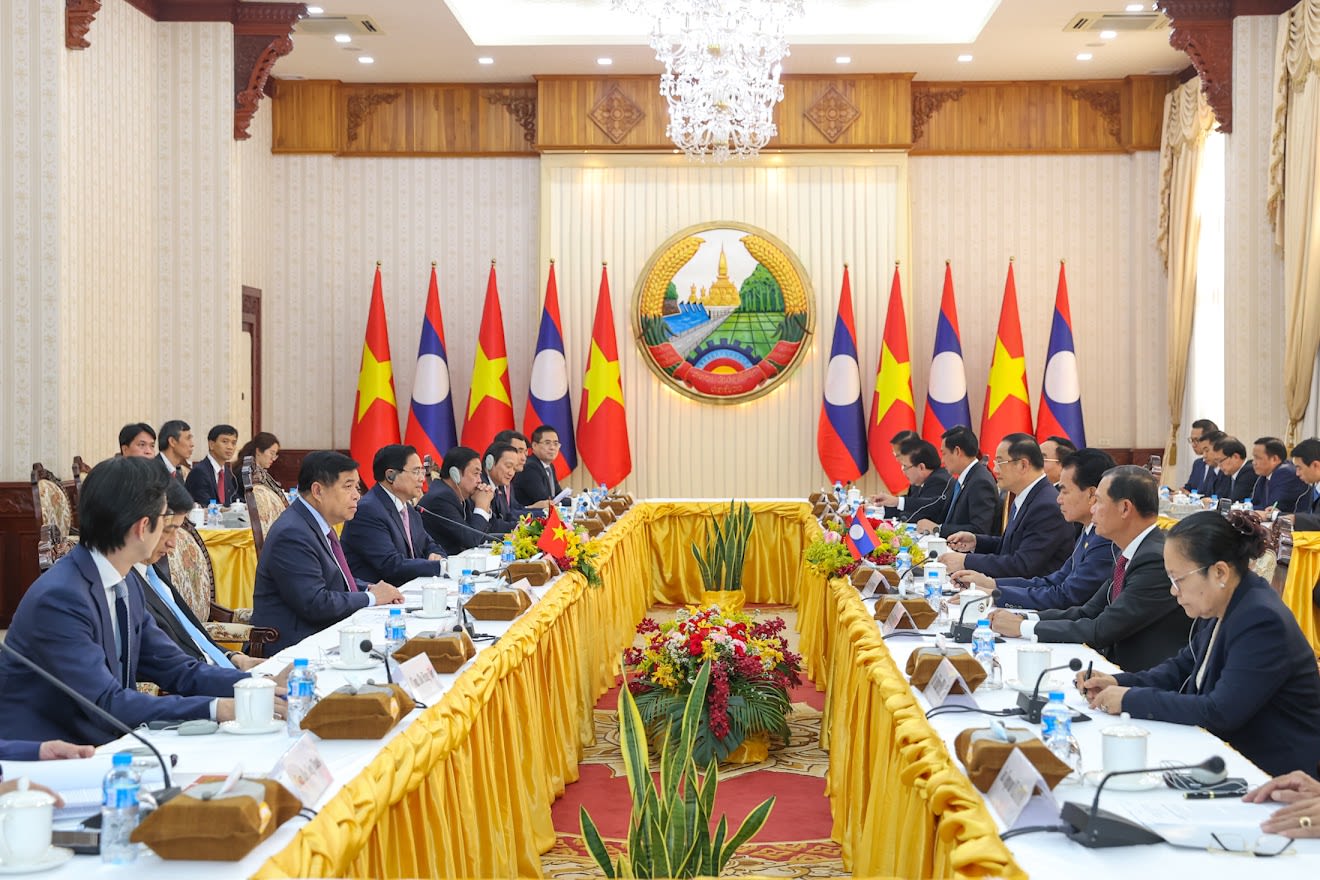
PM Pham Minh Chinh worked with his Lao counterpart Sonexay Siphandone.
PM Pham Minh Chinh worked with his Lao counterpart Sonexay Siphandone.
The two Prime Ministers highly appreciated the development of the great friendship, special solidarity and comprehensive cooperation between Vietnam and Laos over the past years. The two sides agreed to make efforts to implement the Vietnam-Laos cooperation strategy agreement for the 2021-2030 period, the Vietnam-Laos bilateral cooperation agreement for 2021-2023 and other signed high-level agreements and cooperation plans, as well as strengthen the exchange of delegations at all levels and channels, coordinate each other in ensuring social security, order and safety, and enhance cooperation in security and defence. The two sides also agreed to continue to boost economic cooperation; support each other in building an independent and self-reliant economy associated with substantive, extensive and effective international integration; promote the connection between the two economies; improve the quality and efficiency of aid projects; focus on removing obstacles, definitively solving some backlogs and accelerating the implementation of key projects.